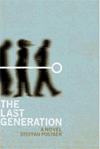Once considered a writer’s last resort, online publishing has many advantages.
August 20, 2010
While major publishing deals with big NY imprints are still the fantasy of every author (including this one), using the Internet to publish one’s content has become almost as fashionable as it is common. A sea change has occurred. Pre-Internet, publishing your own words (be they editorial or fiction) was considered the hallmark of charlatans, dubious gurus and bored housewives. Self-publishing was like a drain trap, keeping you from the bottom, yes, but hardly up on top.
Blogging changed all that. We are nowhere near as fringe as we were ten years ago, last year, or even last week. Every day new creators and aggregators emerge while preexisting ones get better at their craft and grow audiences doing so.
Blogs and other self-published material are an exploding part of popular culture, whether the old-line entertainment, journalism and publishing entities like it or not.
Focusing on book publishing, I’ve unexpectedly discovered aspects to online publishing that actually trump the old-fashioned variety. Though seemingly obvious now, they first came as pleasant surprises.
A major bonus with online publishing is that authors can continuously update and correct their content. Get a fact wrong you can amend it. Lord knows this will prevent countless apologies and lawsuits.
But what about fiction? Since I started publishing chapters of Sweet by Design, several readers have discovered typos and reported them to me. Had this happened with a real book I’d be SOL. But in this case I merely went into my blog’s dashboard and edited the manuscript. No fuss. No muss. It’s like the mistake never happened.
In some respects readers are becoming editors much the way authors have become publishers. That’s a level of interactivity I hadn’t anticipated. At first scary (OMG, someone found a mistake!), I now find it to be a privilege. So, before I write another word: Thank you, Gentle Readers slash Editors. You know who you are.
Another cool variation is updating content for cultural or temporal reasons. For example, in Sweet by Design I mention numerous people, places and things indigenous to Chicago and parts of Wisconsin. Well, since writing the novel one or two of these places has gone out of business, with more undoubtedly to follow. (Thank you recession.) Nothing dates fiction more than passé references. But now, when I’m uploading text and notice such an occurrence, I can edit or do a quick rewrite. My content never gets old. (Be nice, people.) It’s like having the Picture of Dorian Gray for your novel. Stuck up on a shelf, a book gets older and older but online it’s forever young!




 The Happy Soul Industry
The Happy Soul Industry The Last Generation
The Last Generation
FYI, have you read Janet Reid’ blog criticizing manuscript proposals:
http://queryshark.blogspot.com/
She’s like Simon Cowell of the publishing world; but funny even for non writers (as long you ‘get’ her sense of humor..